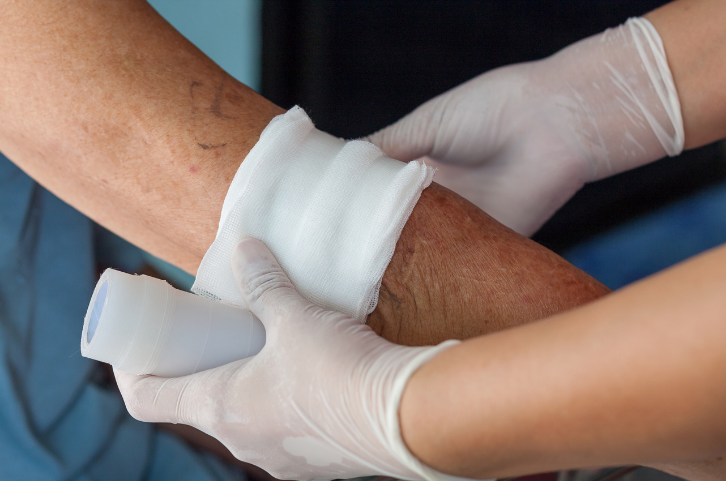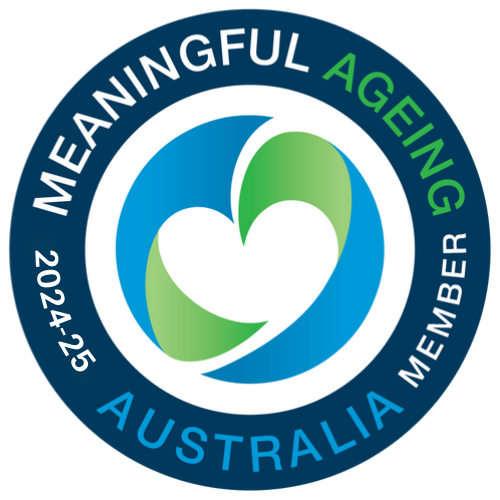Did you know that our largest organ is our skin? As we get older, our skin can get drier and become more susceptible to tears and wounds, making it important that we take care of our skin as we get older. Read more to find out how we can prevent our clients from getting skin wounds, and care tips for wound healing in the eldery.

Causes of skin tears in elderly
A skin tear is a break in the skin which can lead to “peeling back” of the skin. When this occurs in the elderly, often due to a fall, bump, or removal of an adhesive such as a bandaird, it can be very serious, therefore, wound care in elderly patients is crucial to maintaining health and wellbeing.
Prevention of skin tears in elderly
Keeping skin moisturised
The good news is that, by moisturising peoples arms and legs twice a day, a client can protect more fragile areas of their skin and halve their chances of getting a skin tear. We recommend using fragrance free and allergen free moisturisers, as these products are suited to most skin types, including those with eczema. Using soap when showering or bathing can actually dry our skin out more, so try using a soap substitute, such as Sorbelene cleanser.
Maintaining a balanced diet
Much like many other health maintenance advice, a healthy, balanced diet can do wonders – and preventing skin tears in the elderly is no exception! Drinking plenty of water and eating foods rich in nutritional value can greatly help to keep skin healthy, although it is important not to make drastic changes to one’s diet without their doctors approval).
Ensuring a safe living space
Taking pre-emptive measures around the house to minimise the chance of a fall is key in preventing skin tears. Keeping the home clutter free, ensuring that there are no obstructions to cause tripping or bumping as well as keeping the indoors well lit are all essential tips for maintaining safety. Wearing longer sleeved clothing and trousers can help add a layer of protection to the limbs for wound minimisation should any bump or fall occur.
Skin tear treatment in elderly
At Vital Home Health Services, our clinical nurses are well trained and well experienced in treating skin tears and managing wounds, and have provided advice on what to do if this situation occurs.
- Firstly, ensure your hands are clean and dry before handling skin wounds.
- Apply gentle pressure to the affected area to slow down and stop bleeding. If you are helpimg others, maintain communication with the person you are helping to make sure you are not causing them any additional pain by applying pressure to their injury.
- You can clean the site of the wound using water to remove any specks of dirt that may have landed on the area, then dry the skin with a clean a disposable soft paper towel by dapping and not rubbing.
- Make sure that the skin flap, that is still attached to the wound is not cut off, but gently nudged back into place. Keeping the skin flap intact can help with the healing process.
- Using a non-adhesive bandage is a good idea. Avoid adhesive dressings for skin tears in the elderly, as these may worsen the tear upon removal.
Upon completion of these steps, get in touch with a doctor or community clinical nurse so that they can inspect the wound and ensure that the right steps have been taken to encourage healing.
In most instances, the skin tear should heal within 2 weeks, however, there are some instances where you may want to take your loved one or client to see a doctor, such as:
- If the wound is not healed within 2 weeks
- There is increased redness or swelling around the wound
- There is increased or new pain from the wound
- Excessive weeping from the wound
- The wound is producing a smell
- The person is feeling unwell or has a fever
- There is yellowing or blackening around the wound
If you are concerned in any way, do not hesitate to follow up with a doctor.
In summary, skin tears and wounds can be a serious matter for older people. It is wise to put preventative measures in place to help them from occurring, as well as understanding the correct way to address any accidents promptly and safely to avoid further complications arising.
The Vital Home Health Services team can provide wound management support, including complex wounds, as part of a range of services. If you are looking to care for a loved one, you can find out more about our services here.








